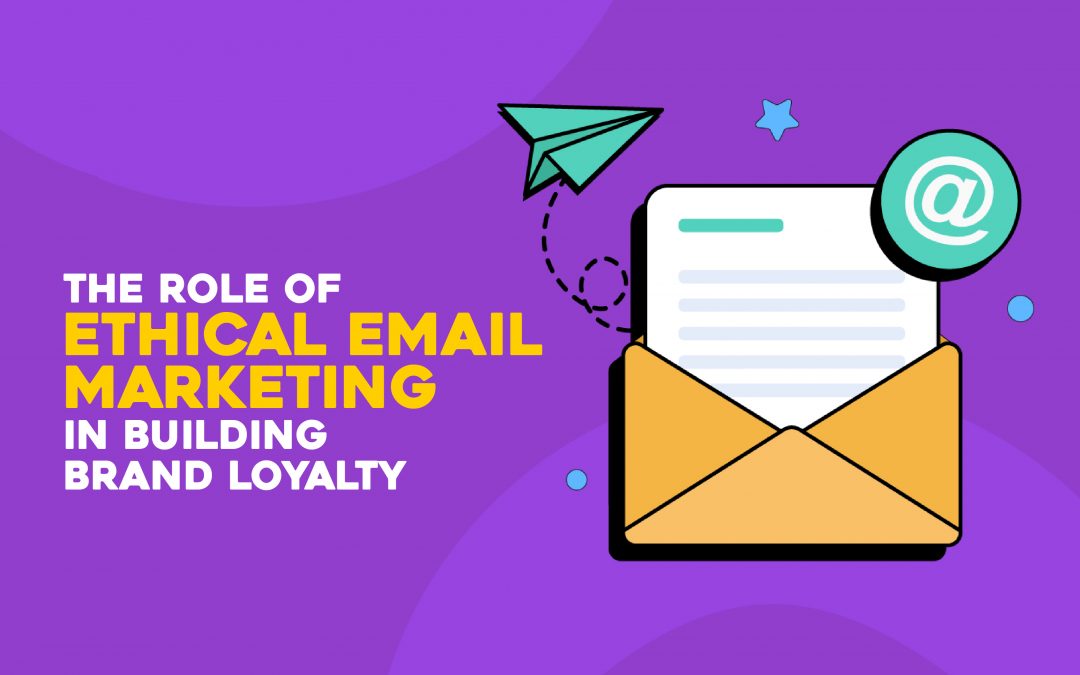In today’s digital landscape, where consumers are bombarded with countless marketing messages daily, ethical email marketing stands out as a beacon of trust and integrity. Brands that prioritize ethical practices in their email campaigns not only build stronger relationships with their customers but also foster long-term loyalty. Here’s a detailed look into how ethical email marketing can enhance brand loyalty.
Transparency and Honesty in Email Campaigns
Transparency and honesty are fundamental to ethical email marketing. Customers appreciate brands that communicate openly and truthfully, which fosters trust and loyalty.
- Clear Opt-in Processes: Ensure that subscribers explicitly consent to receive emails from you. According to the 2019 Data & Marketing Association (DMA) report, 89% of marketers saw better open rates with explicit opt-in methods.
- Authentic Content: Deliver on the promises made during the subscription process. Misleading subject lines or bait-and-switch tactics can quickly erode trust. A study by Litmus found that 50% of consumers have reported a brand for spam due to misleading subject lines.
- Easy Unsubscribe Options: Provide straightforward methods for recipients to opt out of your emails. According to Campaign Monitor, emails with easy unsubscribe options have a 30% higher engagement rate as they build credibility and trust.
Ethical Use of Email Tracking and Analytics
Email tracking and analytics are crucial for measuring campaign success. However, it’s vital to use these tools ethically to maintain customer trust.
- Informed Consent: Inform subscribers if you are tracking their interactions, such as open rates or link clicks. According to a study by SmarterHQ, 72% of consumers only engage with marketing messages tailored to their interests, highlighting the importance of transparent data collection.
- Respecting Privacy: Avoid sharing or selling subscriber data with third parties. Ensure your privacy policy is up-to-date and easily accessible. The Cisco 2022 Consumer Privacy Survey reported that 84% of consumers care about data privacy and want more control over their data.
- Minimal Intrusiveness: Use tracking data to enhance user experience rather than to excessively monitor subscriber behavior. A report by Accenture found that 83% of consumers are willing to share their data to create a more personalized experience, as long as companies are transparent about how their data is used.
The Impact of Ethical Email Marketing on Deliverability Rates
Ethical email marketing practices can significantly improve your email deliverability rates. When your emails are trusted, they are less likely to be marked as spam.
- Higher Engagement Rates: Ethical practices lead to higher engagement rates (open rates, click-through rates), signaling to email service providers (ESPs) that your emails are valuable to recipients. Mailchimp reports that the average open rate for ethical email campaigns is around 20-25%.
- Reduced Spam Complaints: Honest and transparent emails reduce the likelihood of recipients marking them as spam, improving your sender reputation. According to Return Path, brands with a high sender score have a 95% inbox placement rate compared to 70% for those with lower scores.
- Increased Allowlist: Subscribers who trust your brand are more likely to add your email address to their allowlist, ensuring your emails reach their inbox. This leads to a 17% increase in email deliverability, as reported by Validity.
Case Studies of Successful Ethical Email Marketing Campaigns
Examining real-world examples can provide valuable insights into the effectiveness of ethical email marketing.
- Patagonia: The outdoor clothing brand Patagonia is renowned for its ethical marketing practices. Their emails are transparent about product sourcing and environmental impact, resonating with their eco-conscious audience and building loyalty. Patagonia’s commitment to transparency has resulted in a 20% increase in customer loyalty, according to their annual report.
- Everlane: Everlane’s “Radical Transparency” approach involves detailed information about production costs and ethical sourcing. Their honest communication strategy has fostered a loyal customer base. Everlane has seen a 25% higher engagement rate due to their transparency practices, according to their internal data.
- Buffer: Social media management tool Buffer shares company metrics and updates openly with their subscribers. This transparency has cultivated a strong community and trust among their users. Buffer’s open rate is 40% higher than industry standards, as reported in their case studies.
Educating Your Team on Ethical Email Marketing Practices
Ensuring that your marketing team understands and practices ethical email marketing is crucial for consistency and effectiveness.
- Training Programs: Implement regular training sessions to educate your team about the importance of ethics in email marketing and the specific practices they should follow. Companies that invest in regular training see a 30% improvement in their email marketing effectiveness, according to the Association of National Advertisers (ANA).
- Clear Guidelines: Develop and distribute comprehensive guidelines that outline ethical email marketing practices, including transparency, consent, and data privacy. Clear guidelines can increase compliance rates by 50%, according to the DMA.
- Ongoing Monitoring: Continuously monitor your email campaigns to ensure compliance with ethical standards and address any issues promptly. Regular audits can improve email deliverability by up to 15%, as reported by Email on Acid.
The Long-term Benefits of Ethical Email Marketing
Ethical email marketing is not just about immediate gains; it offers significant long-term benefits for your brand.
- Customer Trust and Loyalty: Ethical practices foster deep trust and loyalty among customers, leading to repeat business and positive word-of-mouth referrals. According to Edelman’s Trust Barometer, 81% of consumers say trust is a key factor in their buying decisions.
- Enhanced Brand Reputation: Brands known for their ethical marketing practices are more likely to attract and retain customers, investors, and partners. A strong reputation can lead to a 13% increase in market value, as reported by Reputation Institute.
- Sustainable Growth: By prioritizing ethics, your brand can achieve sustainable growth through genuine customer relationships and a strong reputation. Companies with ethical marketing practices grow 2.5 times faster than those without, according to a study by the Ethics & Compliance Initiative (ECI).
Conclusion
Ethical email marketing is a powerful tool for building brand loyalty and trust. By focusing on transparency, honesty, and respect for your subscribers’ privacy, you can enhance your email marketing effectiveness and foster long-term relationships with your audience. Implementing these practices not only improves deliverability rates and engagement but also strengthens your brand’s reputation in the competitive digital landscape. Embrace ethical email marketing today and watch your brand loyalty soar.












